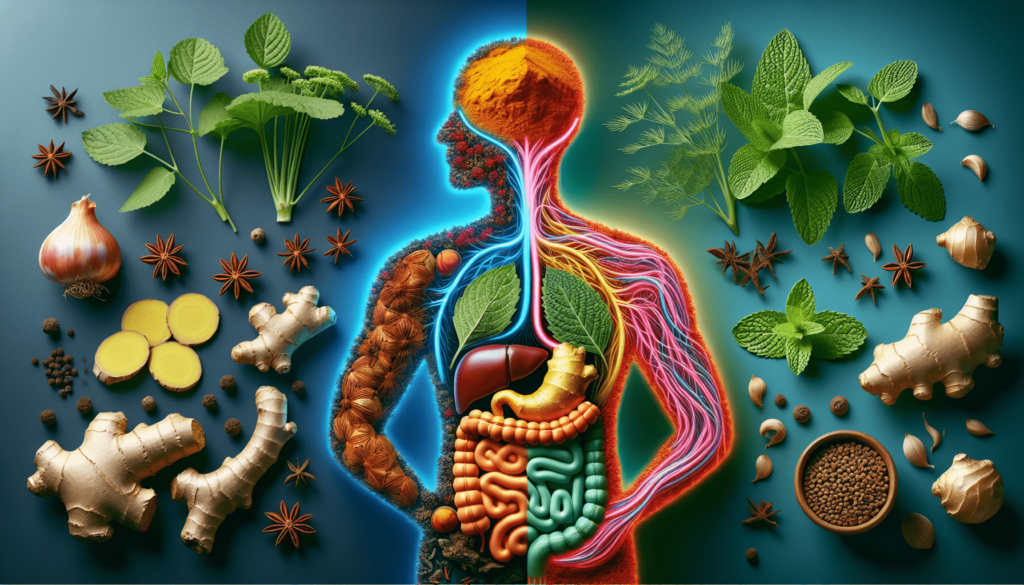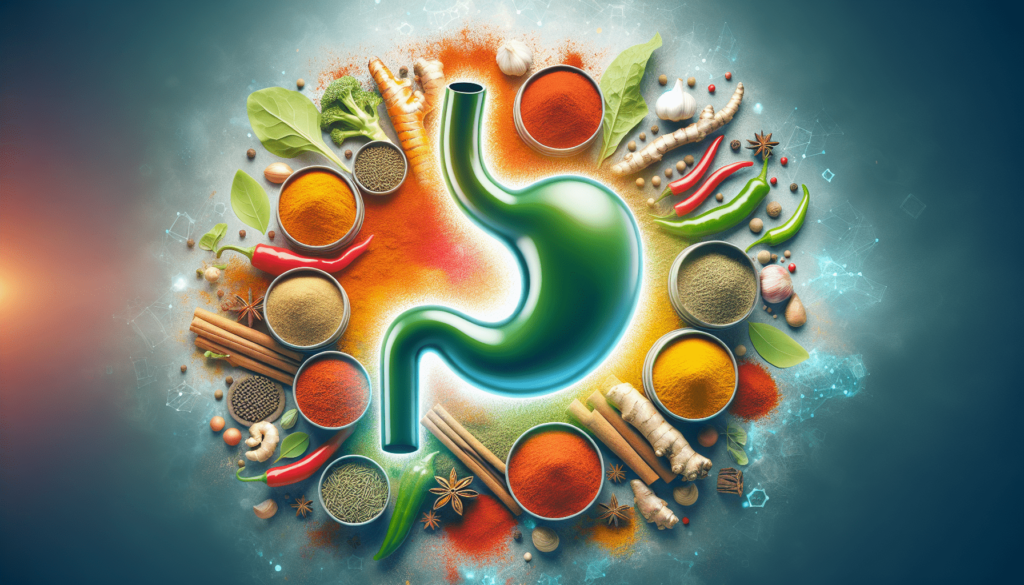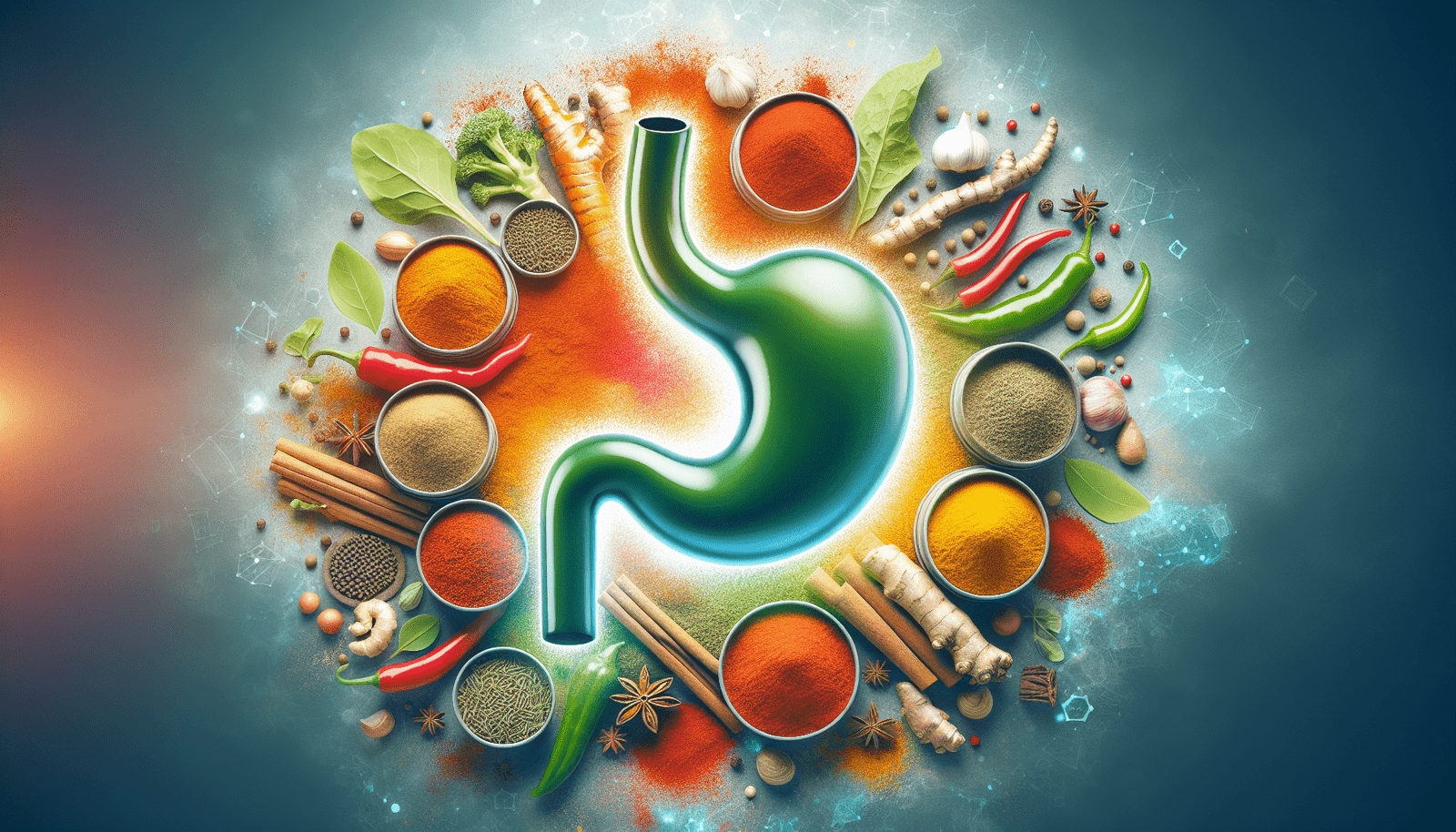Have you ever experienced the uncomfortable sensation of bloating after a meal? If so, you’re not alone. Bloating is a common issue that many people face, and it can leave you feeling sluggish and uncomfortable. But did you know that there may be a simple solution to this problem? It turns out that certain spices may have the power to alleviate bloating and help you feel better. In this article, we will explore the potential benefits of incorporating specific spices into your diet to combat bloating, providing a natural and delicious way to find relief.
The Science Behind Bloating
Understanding bloating
Bloating is a common occurrence that many people experience from time to time. It refers to the sensation of feeling full and swollen in the abdomen, often accompanied by discomfort or pain. This can be caused by a buildup of gas in the digestive system, which can lead to a distended abdomen and feelings of heaviness.
Causes of bloating
There are several factors that can contribute to bloating. One of the most common causes is eating too quickly or overeating, which can lead to an excessive amount of air being swallowed. Certain foods, such as beans, lentils, broccoli, and cabbage, are also known to cause bloating due to their high fiber content. Additionally, the body’s inability to properly digest certain carbohydrates, such as lactose or fructose, can also result in bloating.
Spices as Natural Remedies for Bloating
Introduction to spices
Spices have been used for centuries to enhance the flavor of food, but they also offer a range of health benefits. Many spices possess properties that can aid in digestion and alleviate the symptoms of bloating. These natural remedies can be beneficial for those seeking a holistic approach to managing their digestive health.
How spices can alleviate bloating
Spices contain active compounds that have been found to have anti-inflammatory, carminative, and digestive properties. These properties can help reduce inflammation in the gut, ease digestion, and promote the elimination of gas. By incorporating spices into your diet, you can potentially alleviate bloating and improve overall digestive health.

1. Ginger
Properties of ginger
Ginger is a versatile spice that has long been used in traditional medicine for its various health benefits. It contains gingerol, a bioactive compound with potent anti-inflammatory and antioxidant properties. Ginger is also known for its ability to reduce muscle spasms and soothe the gastrointestinal tract.
Ginger’s role in reducing bloating
Ginger has been shown to effectively reduce bloating and other digestive symptoms. It can help stimulate the production of digestive enzymes, which aids in the breakdown of food and prevents the buildup of gas. Additionally, ginger has been found to relax the muscles of the gastrointestinal tract, allowing for smoother digestion and reducing the likelihood of bloating.
2. Turmeric
Characteristics of turmeric
Turmeric is a vibrant yellow spice commonly used in Indian and Southeast Asian cuisine. It contains a compound called curcumin, which is known for its powerful anti-inflammatory and antioxidant properties. Turmeric has been used for centuries in traditional medicine to aid digestion and promote overall wellness.
Turmeric’s effects on bloating
The anti-inflammatory properties of turmeric can help reduce inflammation in the digestive system, relieving symptoms of bloating. It can also stimulate the production of bile, which aids in the digestion of fats and prevents the formation of gas. Turmeric’s ability to support liver function further contributes to its potential to alleviate bloating by promoting efficient digestion.

3. Peppermint
Benefits of peppermint
Peppermint is a refreshing herb that is widely known for its soothing properties. It contains menthol, which has a cooling effect and can help relax the muscles of the gastrointestinal tract. Peppermint has been used for centuries to relieve digestive discomfort, including bloating and gas.
How peppermint aids in relieving bloating
Peppermint has been found to relax the muscles of the intestines, allowing trapped gas to be released more easily. This can help alleviate bloating and reduce feelings of discomfort. Peppermint also has carminative properties, which means it can prevent the formation of gas in the digestive system and promote its elimination.
4. Fennel
Introduction to fennel
Fennel is a herb with a distinct flavor that is commonly used in Mediterranean and Indian cuisine. It has a long history of use as a digestive aid due to its carminative and anti-inflammatory properties. Fennel seeds, in particular, are often consumed after meals to aid digestion and prevent bloating.
Fennel’s impact on reducing bloating
Fennel has been shown to relax the muscles of the gastrointestinal tract, allowing for improved digestion and the prevention of bloating. The active compounds in fennel seeds, such as anethole, can also help reduce inflammation in the gut, relieving digestive symptoms. Chewing on fennel seeds or drinking fennel tea can be an effective way to alleviate bloating after meals.
5. Cumin
Properties of cumin
Cumin is a popular spice with a warm and earthy flavor. It is commonly used in Indian, Middle Eastern, and Mexican cuisines. Cumin contains compounds that have been found to have antimicrobial, antioxidant, and anti-inflammatory properties. It has long been used in traditional medicine to aid digestion and promote overall wellness.
How cumin helps alleviate bloating
Cumin can help alleviate bloating by improving digestion and reducing inflammation in the gut. It stimulates the production of enzymes that aid in the breakdown of food, preventing the formation of gas. Additionally, cumin has been found to have antimicrobial properties, which can help maintain a healthy balance of bacteria in the digestive system and reduce the risk of bloating.
6. Coriander
Characteristics of coriander
Coriander, also known as cilantro, is a herb with a fresh and citrusy flavor. It is commonly used in various cuisines around the world. Coriander contains antioxidants and phytonutrients that contribute to its potential health benefits. It has been used in traditional medicine to aid digestion and alleviate digestive discomfort.
Coriander’s role in reducing bloating
Coriander has been found to have carminative properties, which can help prevent the formation of gas and aid in its elimination. It can also help relax the muscles of the gastrointestinal tract, promoting smoother digestion and reducing bloating. Adding coriander leaves or seeds to your meals can be a simple and effective way to incorporate this spice into your diet.
7. Cardamom
Benefits of cardamom
Cardamom is a spice with a distinct and aromatic flavor. It is commonly used in Indian and Middle Eastern cuisines. Cardamom contains compounds that have been found to have antioxidant, anti-inflammatory, and antimicrobial properties. It has been used in traditional medicine for its digestive benefits, including the alleviation of bloating.
How cardamom aids in relieving bloating
Cardamom can help alleviate bloating by promoting the production of digestive enzymes, which aids in the breakdown of food and prevents the buildup of gas. It has also been found to have antispasmodic properties, which can help relax the muscles of the gastrointestinal tract and alleviate digestive discomfort. Consuming cardamom tea or adding cardamom pods to your meals can be an enjoyable way to incorporate this spice into your diet.
8. Dill
Properties of dill
Dill is an herb with a fresh and slightly sweet flavor. It is commonly used in salads, pickles, and seafood dishes. Dill contains compounds that have been found to have antioxidant, anti-inflammatory, and antimicrobial properties. It has a long history of use in traditional medicine to aid digestion and relieve digestive symptoms.
How dill helps alleviate bloating
Dill can help alleviate bloating by relaxing the muscles of the gastrointestinal tract and reducing inflammation in the gut. It can also promote the production of digestive enzymes, aiding in the breakdown of food and preventing the formation of gas. Incorporating dill leaves or seeds into your meals or enjoying a cup of dill tea can be an effective way to harness the potential digestive benefits of this herb.
In conclusion, specific spices have been found to have properties that can aid in alleviating bloating. Ginger, turmeric, peppermint, fennel, cumin, coriander, cardamom, and dill all offer potential digestive benefits and can be easily incorporated into your diet. By incorporating these spices into your meals, you may be able to reduce bloating and promote overall digestive health. However, it is important to note that individual reactions to spices may vary, and it is recommended to consult with a healthcare professional if you experience persistent or severe digestive symptoms.

